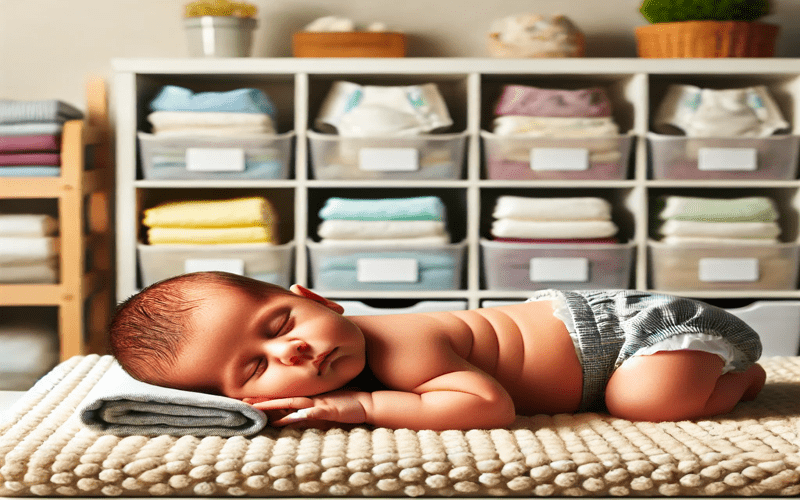
1.Introduction
Cloth diapers are a cost-effective, eco-friendly, and baby-safe alternative to disposables. Parents often ask, how many cloth diapers do I need for newborn? Typically, having 20-30 cloth diapers ensures convenience, easy washing, and a smooth diapering routine. When wondering how many cloth diapers do I need for a newborn, keep in mind that these reusable diapers save money while reducing waste. With different options like prefolds, pocket diapers, and all-in-one (AIO) styles, cloth diapers offer customizable absorbency and better leak protection. Understanding how many cloth diapers do I need for newborn is key to making the right choice for your baby’s comfort and sustainability.
2.Understanding Cloth Diapers
Cloth diapers are eco-friendly, reusable, and cost-effective baby essentials, providing gentle, chemical-free protection while reducing waste, rashes, and expenses—a smart, sustainable choice for parents.
What Are Cloth Diapers?
Cloth diapers are eco-friendly, reusable, and cost-saving alternatives to disposables, offering soft, chemical-free comfort for babies while reducing waste and skin irritation naturally.
Understanding Cloth Material in Cloth Diapers
Cloth diapers are made from different types of fabrics, each with unique benefits. When considering how many cloth diapers do I need for newborn, understanding these fabric types can help you select the best option for your baby’s comfort and needs.
- Cotton: Soft, breathable, and highly absorbent, making it a popular choice for newborns. One frequent query parents have is, , With cotton diapers, having 20 to 30 guarantees a consistent stock.
- Bamboo: Naturally antibacterial and super absorbent, great for sensitive skin. If you’re still thinking, How many cloth diapers do I need for newborn?, bamboo options offer excellent absorbency, reducing the need for frequent changes.
- Hemp: Extremely absorbent and durable but takes longer to dry.
- Microfiber: Quick-drying and absorbent but should not be placed directly on the baby’s skin.
- Wool: Used in covers, providing breathability and excellent moisture resistance.
Benefits of Cloth Diapers
Cloth diapers are a preferred choice for many parents, but a common question is: how many cloth diapers do i need for newborn Typically, newborns require 20-30.
- Eco-Friendly: Cloth diapers significantly reduce waste, helping to minimize landfill pollution.
- Cost-Effective: While the initial investment is higher, they save money in the long run as they are reusable.
- Gentle on Baby’s Skin: Made from soft, natural fabrics, they reduce the risk of rashes and irritation.
- Customizable Absorbency: Different inserts and layering options allow parents to adjust absorbency based on the baby’s needs.
- Stylish & Versatile: Available in various designs, colors, and patterns, making diapering a fun experience.
How Are Cloth Diapers Different from Disposable Diapers?
Understanding how many cloth diapers do I need for newborn and the difference between cloth and disposable diapers can help parents make an informed decision for their baby’s comfort, cost savings, and the environment.
| Feature | Cloth Diapers | Disposable Diapers |
|---|---|---|
| Reusability | Yes | No |
| Cost Over Time | Lower | Higher |
| Eco-Friendliness | High | Low |
| Skin Sensitivity | Gentle | May cause rashes |
| Convenience | Requires washing | Easy to use |
What’s the recommended amount of cloth diapers for a newborn?
One of the most common questions parents ask is how many cloth diapers do I need for newborn? The answer depends on factors like washing frequency and diapering style.
- Newborns require 10-12 diaper changes per day.
- If washing daily, around 20-24 cloth diapers are recommended.
- If washing every two days, consider 30-36 cloth diapers for convenience.
- Having extra diaper inserts and liners can improve absorbency and reduce laundry loads.
Wondering about the best sleep environment for your baby? Read our guide on Can a Newborn Sleep with a Fan? to learn about safety tips and benefits of using a fan in a baby’s room.
3.Different Types of Cloth Diapers
How many reusable diapers are necessary for newborn? Choosing the right cloth diapers for newborns is essential for comfort, cost savings, and sustainability. Here’s a breakdown of the main types of cloth diapers that best suit your needs.
1.Prefolds
Pros: Budget-friendly, highly absorbent, dries quickly.
Cons: Requires folding and a separate waterproof cover.
2.Pocket Diapers
Pros: Customizable absorbency, simple to clean, dries fast.
Cons: Needs stuffing inserts, slightly bulkier fit.
3.All-in-One (AIO) Diapers
Pros: Super easy to use, no stuffing required, perfect for beginners.
Cons: Takes longer to dry, can be bulkier on newborns.
4.Fitted Diapers
Pros: Excellent absorbency, ideal for nighttime use.
Cons: Requires a waterproof cover, slightly more expensive.
Why Choose Cloth Diapers for Newborns?
1.Soft & Gentle on Baby’s Skin
Made with chemical-free, breathable fabrics that prevent diaper rashes.
2.Cost-Effective Choice
Saves money compared to buying disposables regularly.
3.Environmentally Friendly
Reduces landfill waste and carbon footprint.
4.Adjustable Absorbency
Different inserts allow for customized leak protection.
5.Fewer Diaper Blowouts
Offers a snug fit that prevents messy leaks.
How Many Cloth Diapers Are Required for a Newborn Baby?
Newborns need 20-30 cloth diapers for convenience. Eager to know how many cloth diapers do I need for newborn? Here’s a helpful guideline!
- Full-time use: 24-30 diapers
- Part-time use: 12-18 diapers
- Overnight use: Extra-absorbent fitted or AIO diapers.
4.Cloth Diapering Tips for New Parents
How to Build a Cloth Diaper Stash
Building a cloth diaper stash is essential for convenience and savings. Knowing how many cloth diapers you need for newborn helps you plan your purchase wisely.
- How Many Cloth Diapers Should I Have for Newborn? Most parents need 20-30 cloth diapers for a newborn.
- Mix Different Styles – Try pocket diapers, all-in-ones, and prefolds to see what works best.
- Buy in Bulk & Save Money – Buying cloth diaper bundles reduces cost.
- Choose Adjustable Sizes – One-size diapers grow with your baby, saving money in the long run.
How to Care for Cloth Diapers
Proper care ensures long-lasting, absorbent, and odor-free diapers.
- Use the Right Detergent – Choose fragrance-free, cloth-safe detergent to prevent build-up.
- How Many Cloth Diapers Are Needed for Newborn Baby? Keeping at least 24 diapers allows for a smooth wash routine.
- Wash Routine – Pre-rinse in cold water, wash in warm water, extra rinse to remove detergent residue.
- Avoid Fabric Softeners – They reduce absorbency and cause diaper leaks.
- Proper Storage – Use a wet bag for travel and a diaper pail at home.
Tips for Avoiding Diaper Rash and Leaks
Preventing diaper rash and leaks ensures a comfortable experience for your baby. If you’re wondering, How many cloth diapers do I need for newborn?, having 20 to 30 ensures frequent changes, keeping your baby dry and rash-free. Choosing the right fabric, like cotton or bamboo, also helps prevent leaks. For parents asking, How many cloth diapers do I need for newborn?, a well-stocked stash provides comfort and protection while ensuring an easy diapering routine.
- Use Breathable Fabrics – Cotton and bamboo allow airflow and prevent rashes.
- Apply Cloth-Safe Creams – Avoid petroleum-based creams as they reduce absorbency.
- Ensure a Proper Fit – A snug but not tight fit prevents leaks and keeps the diaper comfortable.
- Try Double Gussets & Covers – These add extra protection against leaks.
- How Many Cloth Diapers Are Needed for Newborn Baby? Keeping enough diapers on hand ensures frequent changes, helping to prevent diaper rashes.
5.Cost of Cloth Diapers for Newborns
Newborn cloth diapers are cost-effective, reusable, and eco-friendly, saving parents money while reducing waste and providing gentle, chemical-free protection for babies.
Initial Investment
Cloth diapering requires an upfront investment, but it saves thousands of dollars in the long run. Here’s a breakdown of the costs:
How Many Cloth Diapers Are Essential for Newborn? Most parents need 20-30 cloth diapers for full-time use. Diaper Costs – Good quality cloth diapers cost $5-$25 each, depending on the brand and type. Accessories – You may need wet bags, diaper pail liners, and cloth wipes, costing around $50-$100.Detergent & Maintenance – A cloth-safe detergent and water usage add minor monthly costs. Total Initial Cost – A full cloth diaper stash costs $300-$600, compared to $2,000-$3,000 spent on disposables over 2-3 years.
Long-Term Savings
Cloth diapers are a one-time investment. Understanding how many cloth diapers you need for newborn saves money over time.
Cloth diapers are cost-effective and reusable for multiple kids, reducing expenses and waste. A lot of parents wonder “How many cloth diapers do I need for newborn?” Typically, 20-30 are ideal. They’re breathable, promoting comfort—one of the tips for getting a newborn to sleep in a bassinet peacefully.
6. Stain & Odor Removal in Cloth Diapers
Keeping cloth diapers clean is simple. How Many Cloth Diapers Are Recommended for Newborn? A proper stash ensures hygiene, comfort, and better sleep quality for your little one.
- Boost Absorbency with Extra Inserts – Hemp or bamboo inserts soak up more moisture, helping parents wondering, How many cloth diapers do I need for newborn to optimize their stash.
- Stay-Dry Liners for Comfort – Fleece liners keep moisture away, which can support tips for getting a newborn to sleep in a bassinet by ensuring dryness and comfort.
- Check Fit Before Sleep – A snug fit prevents leaks while keeping the baby comfy.
- Experiment with Different Combinations – Every baby is different, so test what works best.
Conclusion
Cloth diapers are an excellent choice for parents looking for an eco-friendly, budget-friendly, and baby-safe alternative to disposables. They help reduce landfill waste, save money in the long run, and provide superior comfort for babies. With customizable absorbency, better leak protection, and a reusable design, cloth diapers are a smart investment.
A frequent inquiry from parents is, “how many cloth diapers do I need for newborn?” Generally, having 20-30 cloth diapers ensures a smooth diapering routine. Proper washing and care extend their lifespan, making them even more cost-effective.
If you’re wondering, “how many cloth diapers do I need for newborn?”, the answer depends on your washing frequency, but a well-prepared stash ensures convenience. Cloth diapers not only keep your baby’s skin healthy but also contribute to a cleaner planet. Choosing them means making a responsible decision for both your child and the environment.
FAQs
1. How many cloth nappies do I need for a newborn?
For a newborn, you’ll need about 20-30 cloth nappies to ensure you always have clean ones. Washing every 2-3 days will keep your supply steady without running out.
2. Is 12 cloth diapers enough?
Twelve cloth diapers are only sufficient for part-time use. For full-time cloth diapering, you’ll need 24-36 diapers to ensure convenience and avoid running out between washes.
3. How often should I change my newborn’s cloth diaper?
Change your newborn’s cloth diaper every 2-3 hours or as soon as it’s wet or soiled. Frequent changes prevent rashes, discomfort, and ensure your baby’s skin stays healthy.
4. How many diapers will I need in total?
For full-time cloth diapering, having 24-36 diapers ensures you always have enough clean ones available, while allowing you to wash the used ones every few days.
